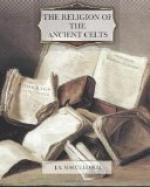Among other culture gods were those associated with the arts and crafts—the development of Celtic art in metal-work necessitating the existence of gods of this art. Such a god is Goibniu, eponymous god of smiths (Old Ir. goba, “smith"), and the divine craftsman at the battle of Mag-tured, making spears which never failed to kill.[258] Smiths have everywhere been regarded as uncanny—a tradition surviving from the first introduction of metal among those hitherto accustomed to stone weapons and tools. S. Patrick prayed against the “spells of women, smiths, and Druids,” and it is thus not surprising to find that Goibniu had a reputation for magic, even among Christians. A spell for making butter, in an eighth century MS. preserved at S. Gall, appeals to his “science."[259] Curiously enough, Goibniu is also connected with the culinary art in myth, and, like Hephaistos, prepares the feast of the gods, while his ale preserves their immortality.[260] The elation produced by heady liquors caused them to be regarded as draughts of immortality, like Soma, Haoma, or nectar. Goibniu survives in tradition as the Gobhan Saer, to whom the building of round towers is ascribed.
Another god of crafts was Creidne the brazier (Ir. cerd, “artificer”; cf. Scots caird, “tinker"), who assisted in making a silver hand for Nuada, and supplied with magical rapidity parts of the weapons used at Mag-tured.[261] According to the annalists, he was drowned while bringing golden ore from Spain.[262] Luchtine, god of carpenters, provided spear-handles for the battle, and with marvellous skill flung them into the sockets of the spear-heads.[263]
Diancecht, whose name may mean “swift in power,” was god of medicine, and, with Creidne’s help, fashioned a silver hand for Nuada.[264] His son Miach replaced this by a magic restoration of the real hand, and in jealousy his father slew him—a version of the Maerchen formula of the jealous master. Three hundred and sixty-five herbs grew from his grave, and were arranged according to their properties by his sister Airmed, but Diancecht again confused them, “so that no one knows their proper cures."[265] At the second battle of Mag-tured, Diancecht presided over a healing-well containing magic herbs. These and the power of spells caused the mortally wounded who were placed in it to recover. Hence it was called “the spring of health."[266] Diancecht, associated with a healing-well, may be cognate with Grannos. He is also referred to in the S. Gall MS., where his healing powers are extolled.
An early chief of the gods is Dagda, who, in the story of the battle of Mag-tured, is said to be so called because he promised to do more than all the other gods together. Hence they said, “It is thou art the good hand” (dag-dae). The Coir Anmann explains Dagda as “fire of god” (daig and dea). The true derivation is from dagos, “good,”




